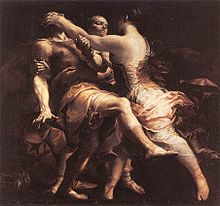Polydoros (son of Priam)



Polydoros ( Greek Πολύδωρος , Latin Polydorus ) is in Greek mythology the youngest son of Priam , king of Troy and Hecabe (after Homer of Laothoe , the daughter of the Leleg king old ). There are different versions of his myth and especially his death.
According to customary tradition and after the drama " Hecabe " by Euripides , his father sent him to his eldest sister Iliona , who was married to Polymestor , a Thracian king , for security and education, before the fall of Troy . He was sent to Chersonesus by his father with great fortunes . However, after the fall of Troy, Polymestor killed Polydoros out of greed and threw the body into the sea. (After the Scholion at Ovid's "Ibis" he cut off his head.)
“You see, the son Polydoros
secretly sent the son of Polydoros with treasures of gold to the Thracian king
to educate him, when
he saw little Dardan weapons and the city surrounded by besieging enemies.
But when the Teukr power was broken, and Fortuna turned, he
paid homage to the weapons of victory and the luck of Agamemnon,
severed the bonds of duty by the youth's murder, and
he took the gold by force! "
" Translation by Wilhelm Vollmer "
Washed up on the bank, he is discovered by his mother Hekabe (now a Greek slave) when she fetches water for the burial of Polyxena . At Hekabe's request, Agamemnon allows Polydoros to be buried with his sacrificed sister, Polyxena. The tragedies tell that later on, Hecabe took terrible revenge by scratching out the eyes of the traitorous Polymestor and killing his children.
In the Iliad , in the tenth year of the war, although Priam held him back from fighting because of his youth, he was still killed as a youth by Achilles without mercy. Thetis later gave his silver armor, which Achilles had taken from him, to Agamemnon. Polydoros was very quick on foot. It only appears in Homer alone, so one might think that the newer writers were just making up the other.
At Virgil's Polymestor had Polydoros killed by throwing a spear. Contrary to the usual tradition, he is buried on the Thracian coast at Polymestor. When Aeneas came there later and cut branches from the myrtle trees growing on the Polydoros burial mound to decorate an altar, not only blackish drops of blood dripped from the branches, but a pitiful groan was heard and a voice called out to him to embrace him in this way not to abuse and warned to leave the curse-covered place:
“What are you tearing me up, poor Aenias? Let me rest in the grave
Guard, O pious, your hand from defilement; Troy bore me,
not a stranger to you. It is not a log from which blood gushes.
Flee this cruel land, flee the shores of covetousness:
Know, I am Polydoros. Here the iron spear seed once
pierced and covered me and overgrown me with pointed shafts. "
" Translation by WAB Hertzberg "
Hyginus relates: Iliona is said to have, since she loved her brother most tenderly, mistaken him for her own son of the same age, about which even her husband knew nothing. He now handed over the supposed Polydorus to the Greeks, who stoned him to death in the camp in the face of Priam. Iliona and Polydoros avenged this outrage by revealing his true parentage to her brother, and both of them murdered the Polymestor.
In the depiction of Dictys (and Cedren ) , Polymestor appears in a less unfavorable light : He delivers the Polydoros to the Telamonian Aias, who ravages the Thracian Chersonese, at the price of peace. The Greeks want to exchange Polydoros for Helena . On the Trojan's refusal they stone him outside the walls of Troy (after Cedren they kill him with the sword) and give his body to his mother, Hecabe, for burial.
Secondary literature
- Benjamin Hederich : POLYDÓRVS. Thorough mythological lexicon. Leipzig 1770, online Sp. 2044-2046
- Wilhelm Vollmer: Polydorus. Dictionary of Mythology. Hoffmann'sche Verlagsbuchhandlung, Stuttgart 1874, 3rd edition: online p. 385
- Otto Höfer : Polydoros . In: Wilhelm Heinrich Roscher (Hrsg.): Detailed lexicon of Greek and Roman mythology . Volume 3.2, Leipzig 1909, Col. 2644 f. ( Digitized version ).
swell
- ↑ Homer , Iliad Χ - 22, 46 ff.
- ↑ Euripides, Hecuba v. 3rd sq.
- ↑ a b Virgil Aeneid , liber III, v. 49-56
- ↑ ad eum Serv. Lc
- ↑ a b c Ovid , Metamorphoseon libri XIII. 430-568.
- ↑ Cic. de or. 3, 219. Dav .; Mythogr. Lat. 2, 209
- ↑ Euripides I. cv 21-26 ff.
- ^ Wilhelm Vollmer: Polydoros, dictionary of the mythology of all nations . Stuttgart 1836, 1st edition: online p. 1345
- ↑ Euripides, Hecuba , 896 ff.
- ^ Euripides lc Act. V.
- ↑ a b Homer, Iliad Υ - 20, 406-410 ff.
- ↑ Quintus of Smyrna , 4, 154; Tzetz. Alleg. 11. 20, 8.
- ↑ Apollodorus 3, 12, 5
- ^ Quintus of Smyrna, 4, 586
- ↑ Dam. Lex. Etymol. p. 2995.
- ↑ Virgil Aeneis , liber III, v. 22nd
- ↑ Virgil Aeneis , liber III, v. 41-46
- ↑ Gottwein.de: The story of the random walks , The poems of P. Virgilius Maro, III: Aeneis
- ^ Hyginus Fabulae , 109.
- ^ Dictys Cretensis, 18.20-28
- ↑ Cedren 1, 222 f. ed. Bon.